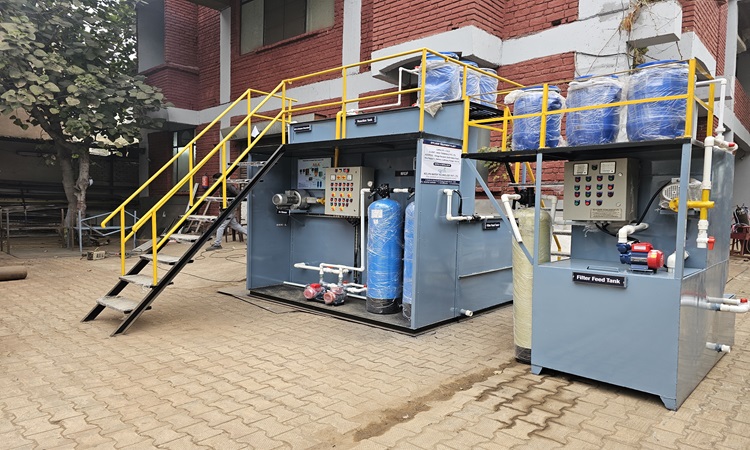Industrial Effluent Treatment Plant

Industrial effluent treatment plant (ETP) play a vital role in treating wastewater generated by industries before it is discharged into the environment. These treatment plants help remove harmful chemicals, solid particles, organic matter, and other pollutants, ensuring compliance with environmental standards and protecting natural water resources.
Need for Industrial Effluent Treatment Plants
Industries generate wastewater containing various pollutants that can severely impact water bodies, soil, and ecosystems if discharged untreated. The primary reasons why ETPs are essential for industries include:
- Environmental Protection: Prevents contamination of rivers, lakes, and groundwater sources.
- Regulatory Compliance: Helps industries meet pollution control norms and avoid legal penalties.
- Resource Conservation: Enables the recycling and reuse of treated water, reducing freshwater consumption.
- Public Health Safety: Reduces exposure to harmful chemicals that could affect human health.
Process of Industrial Effluent Treatment
Effluent treatment involves multiple stages to effectively remove contaminants and make the water safe for discharge or reuse. The treatment process is generally divided into the following steps:
1. Primary Treatment
This stage removes large solids and floating particles through physical processes such as:
- Screening: Filters out large debris like plastic, paper, and metal scraps.
- Sedimentation: Allows heavier solids to settle at the bottom while lighter particles float.
- Chemical Coagulation: Uses chemicals to clump smaller particles into larger ones for easier removal.
2. Secondary Treatment
This stage focuses on biological processes to degrade organic pollutants. Common methods include:
- Activated Sludge Process: Breakdown organic matter by use microorganisms.
- Trickling Filters: Involves passing wastewater over a bed of microorganisms that consume contaminants.
- Anaerobic Digestion: Converts organic waste into biogas using bacteria in oxygen-free conditions.
3. Tertiary Treatment
This is the final purification stage to remove residual contaminants and make the water reusable. Techniques include:
- Filtration: Sand or carbon filters to remove fine particles.
- Disinfection: Chlorination, ozone treatment, or UV radiation to kill harmful bacteria.
- Reverse Osmosis (RO): A membrane-based process for removing dissolved salts and chemicals.
Kelvin Water Technologies – Leading ETP Manufacturer
Kelvin Water Technologies is a well-known company specializing in manufacturing high-quality industrial effluent treatment plants. Their ETPs are designed to meet the needs of different industries, ensuring efficient wastewater treatment and regulatory compliance.
Key Features of Kelvin Water Technologies’ ETPs:
1. Customizable Capacities: Kelvin offers ETPs with capacities ranging from 1 KLD to 20 MLD, tailored to industry requirements.
2. Advanced Technology: Uses Chemi physical and biological treatment methods for superior efficiency.
3. Space-Efficient Design: Compact structures require minimal space for installation.
4. Automated & Semi-Automated Operations: Ensures easy operation and maintenance.
5. Portable & Modular Systems: Can be relocated or expanded as needed.
Industries such as pharmaceuticals, textiles, chemicals, food processing, and manufacturing rely on Kelvin Water Technologies for their wastewater treatment solutions. Their ETPs not only ensure environmental compliance but also promote sustainability by enabling wastewater recycling.
Common Effluent Treatment Plants (CETP) – A Shared Solution for Small Industries
For small and medium enterprises (SMEs), setting up an individual ETP can be expensive. A Common Effluent Treatment Plant (CETP) allows multiple industries to share a centralized wastewater treatment facility. Benefits of CETPs include:
- Cost Reduction: Shared treatment facilities lower individual costs.
- Improved Efficiency: Centralized monitoring ensures better compliance with environmental regulations.
- Water Reuse Potential: Treated water can be reused for industrial processes, reducing freshwater demand.
Conclusion
Industrial effluent treatment plant is crucial for minimizing industrial pollution and protecting the environment. Companies like Kelvin Water Technologies provide advanced ETP solutions that help industries manage their wastewater effectively while ensuring compliance with environmental regulations. Investing in an efficient ETP not only benefits industries but also contributes to a cleaner and healthier planet.
To use our services right now, you can call us at +91-9812241001 or send us an email at info@kelvinindia.in We will be delighted to assist you!